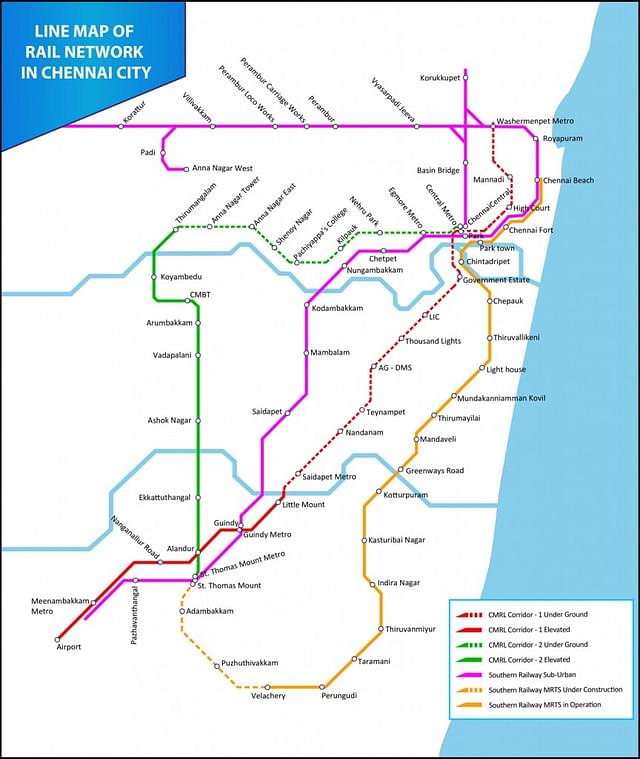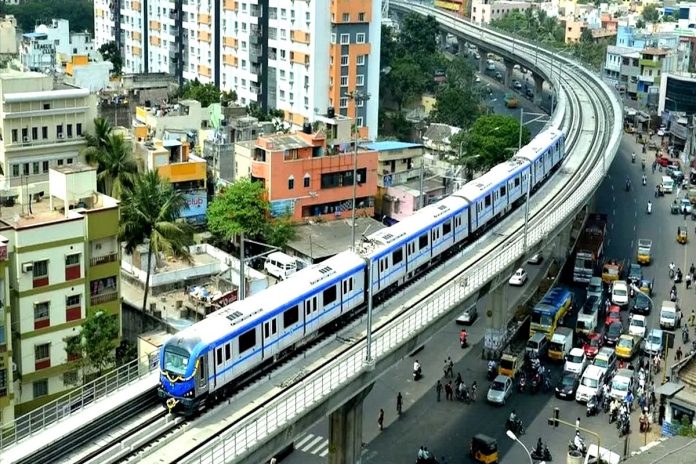Addressing a session at the Confederation of Indian Industry-Tamil Nadu’s (CII-T.N.) Infrastructure Summit 2023, Managing Director M.A. Siddique of Chennai Metro Rail Limited (CMRL) emphasised the necessity for expanding the Metro Rail network.
Revealed in 2019, the Comprehensive Mobility Plan (CMP) for the Chennai Metropolitan Area outlines ambitious plans for the addition of 451 km of Metro lines, exceeding the existing 54 km currently in operation.
In Phase II, an investment of Rs 63,246 crore is allocated for adding 116 km of lines, but an additional 281 km will require an estimated Rs 1 lakh crore.
The summit, themed ‘Building Future Ready Infrastructure for a Trillion-dollar Economy by 2030,’ reflects the joint efforts of the Centre and State governments in Metro Rail development.
Siddique urged a comparison of Chennai not with other Indian cities but with global counterparts like Singapore, Seoul, and Hong Kong, aiming for 30-50 km of Metro lines per 1 million population.
Completion of Phase II will provide 14 km per one million population, and the remaining 281 km will raise this figure to 35 km per one million population, he stated, noting ongoing efforts to update the CMP.
Acknowledging peak-hour rush concerns, Siddique emphasised the need to enhance rolling stock, proposing a shift from four to six cars and a Rs 2,500 crore plan for train procurement, reports The Hindu.
He highlighted efforts by the Chennai Unified Metropolitan Transport Authority (CUMTA) to establish a unified ticketing system, including the National Common Mobility Card (NCMC). Plans for QR codes, ‘on-tap facility’ for bank cards, and inviting electric vehicle (EV) players for last-mile connectivity were also discussed.
Union Minister of State L. Murugan underscored various infrastructure projects by the Centre during the inaugural session, including the PM Mega Integrated Textile Region and Apparel (MITRA) Parks scheme, Housing for All, defense corridor, port and national highway development, and the Jal Jeevan Mission.
Additional speakers at the summit, including Srivats Ram and Rukmini Thiagarajan, delved into topics such as data centers and EV infrastructure in dedicated sessions.
Chennai Metro Phase I
Phase I of the Chennai Metro Rail project covers a length of 45.046 km network and consists of two corridors i.e. Corridor-I from Washermenpet to Airport (23.085 km), Corridor-2 from Chennai Central to St Thomas Mount (21.961 km).
About 55 per cent of the corridors in Phase I is underground and the remaining are elevated. Out of 32 stations 13 are elevated and the remaining 19 are underground. Inter-corridor interchange stations are available in Alandur (elevated) and Chennai Central (underground) respectively.
With a budget of Rs14,600 crore, the Phase I project work began more than 10 years ago. It was completed in stages, with the last portion from AG-DMS to Washermanpet opening to the public in 2019.
The number of passengers has increased from approximately 10,000 back then to more than 2.5 lakhs.

The first segment of the section between Alandur to Koyambedu was commissioned on 29 June 2015.
Chennai Metro Phase II
Phase II expansion has been planned for a length of 118.9 km network with 128 number of stations. It consists of three corridors. Corridor-3 from Madhavaram to SIPCOT (45.8 km), Corridor-4 from Lighthouse to Poonamalle Bypass (26.1 km), Corridor-5 from Madhavaram to Sholinganallur (47 km).


